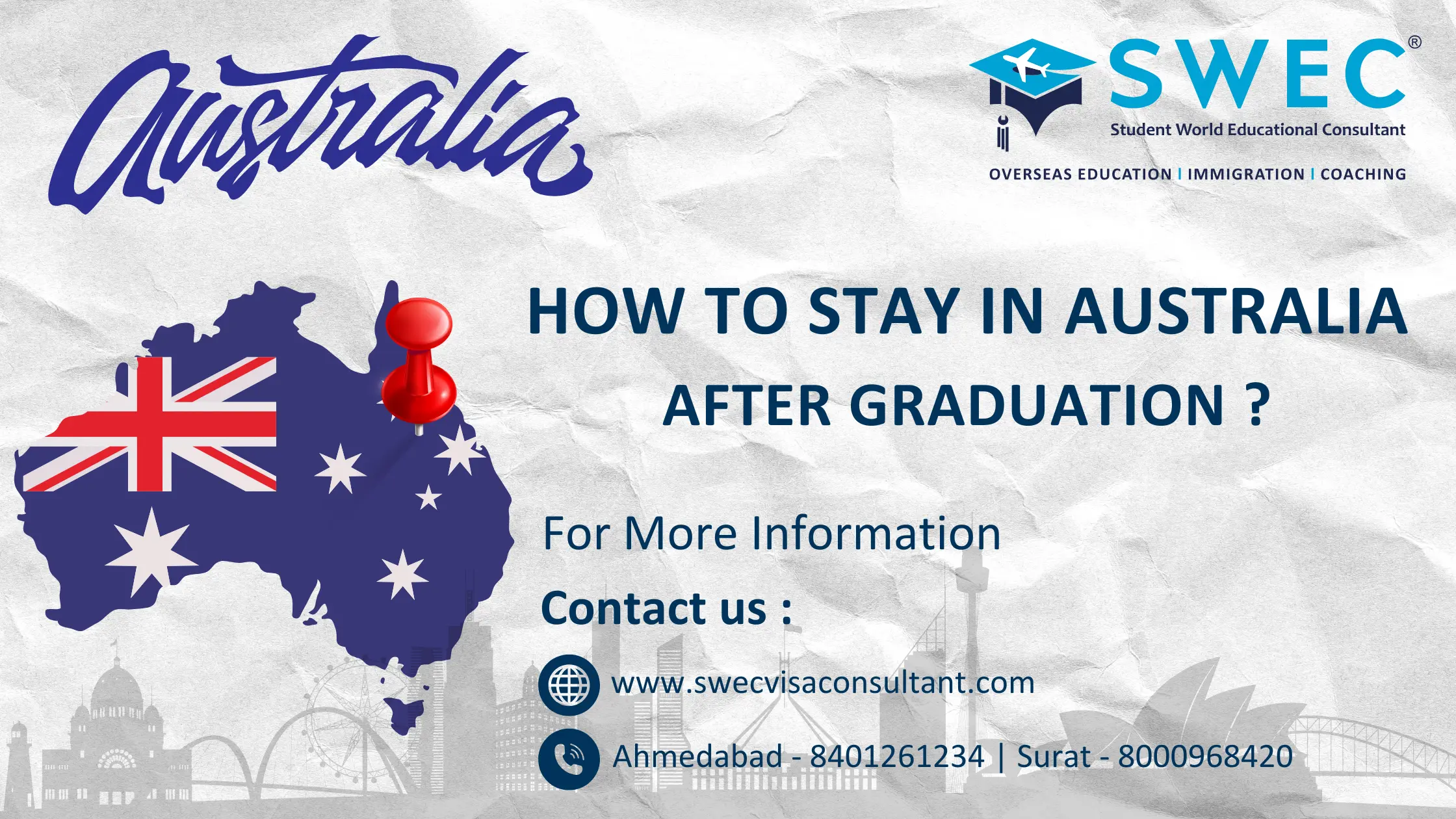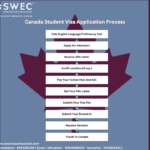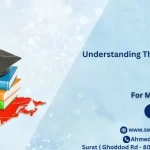Table of Contents
Australia has earned a reputation as one of the most desirable study destinations for international students, thanks to its world-class education system, diverse culture, and high quality of life. Beyond education, Australia offers exceptional opportunities for graduates to stay and build their careers, making it a favoured choice for those looking to secure a brighter future.
Post-graduation, international students can explore several visa options to stay, work, or even gain permanent residency. Understanding these options is crucial to planning your next steps effectively, ensuring a seamless transition from student life to professional aspirations.
Staying in Australia after graduation can significantly shape your career and open doors to long-term opportunities in one of the most livable countries in the world.
“Explore your post-graduation visa options with SWEC Visa experts today!”
Post-Study Work Visa Options
1. Temporary Graduate Visa (Subclass 485):
This visa is the most popular choice for international students seeking to remain in Australia after completing their studies.
Overview and Purpose:
The Subclass 485 visa allows international graduates to live, work, and gain professional experience in Australia.
Streams:
- Graduate Work Stream:
- For graduates with skills listed on the Medium and Long-term Strategic Skills List (MLTSSL).
- Valid for up to 18 months.
- Post-Study Work Stream:
- Available for those with a higher education qualification from an Australian institution.
- Validity depends on the level of qualification (2–4 years).
Eligibility Requirements:
- Must be under 50 years of age.
- Completed a CRICOS-registered course.
- Achieved a minimum English language proficiency score.
Benefits:
- Duration ranges from 18 months to 4 years, depending on the stream.
- Full work rights for the visa holder.
- A pathway to permanent residency through skilled migration.
2. Skilled Graduate Visa (Subclass 476):
This visa caters specifically to recent engineering graduates.
Eligibility Criteria:
- Must have graduated from an accredited institution within the last two years.
- Applicants must be under 31 years old.
Validity and Benefits:
- Valid for up to 18 months.
- Allows unrestricted work and study rights in Australia.
3. Other Visa Options:
Student Guardian Visa (Subclass 590):
- Allows guardians to stay temporarily while supporting students in Australia.
Training Visa (Subclass 407):
- Designed for applicants seeking professional training and skill enhancement.
Permanent Residency Pathways
1. Skilled Migration Visas:
Australia’s skilled migration program is a highly sought-after pathway to permanent residency.
- General Skilled Migration (GSM) Options:
- Skilled Independent Visa (Subclass 189):
- Does not require sponsorship or a job offer.
- Points tested were based on criteria such as age, education, work experience, and English proficiency.
- Skilled Nominated Visa (Subclass 190):
- Requires nomination by an Australian state or territory.
- Benefits include faster processing times and additional points.
- Skilled Work Regional Visa (Subclass 491):
- Designed for those willing to live and work in regional Australia.
- Provides a pathway to permanent residency.
- Skilled Independent Visa (Subclass 189):
- Points-Tested System:
- Key factors include:
- Age (maximum points for applicants aged 25–32).
- English proficiency (higher scores lead to more points).
- Skilled work experience (in and outside Australia).
- Educational qualifications (diplomas, degrees, or trade certificates).
- Key factors include:
2. Employer-Sponsored Visas:
These visas are ideal for graduates with an Australian employer willing to sponsor them.
- Temporary Skill Shortage Visa (Subclass 482):
- Requires employer sponsorship.
- Provides temporary work rights in sectors experiencing skill shortages.
- Employer Nomination Scheme (Subclass 186):
- Leads to permanent residency.
- Requires the applicant to work in a nominated occupation for a sponsoring employer.
3. State and Territory Nominations:
- Benefits of State Sponsorship:
- Additional points for GSM applications.
- Access to unique regional migration pathways.
- Criteria for Regional Migration Programs:
- Must commit to living and working in the sponsoring state or territory for a specified duration.
“Trust SWEC Visa to simplify your post-graduation visa journey. Contact us today to take the next step toward your future in Australia!”
Studying Further to Extend Your Stay
For international graduates seeking to remain in Australia longer, pursuing further studies is a viable option. Whether you want to advance in your current field or switch to a different one, continuing your education can extend your stay and provide new career opportunities.
Options for Pursuing Higher Education or Vocational Courses:
- Higher Education Programs:
- Master’s degrees, PhDs, or postgraduate diplomas in various fields.
- These qualifications can improve your chances for permanent residency by adding points to your PR application.
- Vocational Education and Training (VET) Courses:
- Ideal for those seeking to gain specific skills that are in demand in the Australian labour market.
- VET programs can also contribute to your PR points by aligning with the needs of the Australian economy.
Benefits of Studying Further:
- Maintaining Visa Status:
- Enrolling in a new course helps you extend your stay while keeping your visa status active.
- Enhancing Skills:
- Further education allows you to acquire advanced skills and qualifications, making you more competitive in the job market.
- Improving PR Prospects:
- Completing higher-level education or vocational training can increase your eligibility for permanent residency pathways by adding points to the Skilled Migration Points Test.
Steps to Enroll in a New Course:
- Choosing the Right Program:
- Research programs that align with your career goals and meet the Australian job market’s needs.
- Ensure the course is CRICOS-registered and supports your visa type.
- Updating Your Visa Status:
- Notify the Department of Home Affairs if you are changing courses or extending your stay.
- Apply for a new student visa if required, ensuring that your new course aligns with your future career goals.
Preparing For Your Post-Graduation Journey
After completing your studies, there are several steps you can take to enhance your career prospects and increase your chances of obtaining permanent residency in Australia.
Skills Assessment Process:
A positive skills assessment is crucial for applying for permanent residency through the General Skilled Migration (GSM) program.
- Importance of a Positive Skills Assessment:
- A skills assessment confirms that your qualifications and work experience meet Australian standards.
- The result can influence your PR application success and points score.
- Choosing the Right Skills Assessment Authority:
- Different fields require specific skills assessment authorities. For example, engineering graduates may need to apply through Engineers Australia, while IT professionals may need to assess through the Australian Computer Society (ACS).
- Ensure you select the right authority based on your field to avoid delays or issues in your PR application.
Gaining Relevant Work Experience:
Work experience plays a vital role in improving your PR prospects. It enhances your profile by contributing points to the Skilled Migration Points Test and helps demonstrate your ability to integrate into the Australian workforce.
- Internships, Part-Time Jobs, and Industry Placements:
- These opportunities provide hands-on experience and improve your employability in the Australian job market.
- Participating in internships or part-time jobs while on your student visa helps build a professional network, which can lead to full-time job offers.
- Building a Strong Resume:
- Make sure your work experience aligns with the occupation listed on Australia’s Skilled Occupation List to increase your chances of meeting PR criteria.
Networking and Professional Development:
Building a professional network is crucial for career growth and obtaining permanent residency.
- Importance of Networking:
- Join industry associations, attend career fairs, and engage in online forums related to your field. Networking can help you discover job opportunities and connect with potential employers.
- Attending Career Events and Workshops:
- Participating in career development activities such as workshops, job expos, and professional seminars can help improve your chances of securing a job offer that meets PR requirements.
Challenges In Staying In Australia Post-Graduation
While staying in Australia post-graduation offers many benefits, it also comes with challenges that require careful planning and preparation.
Common Issues Faced by International Graduates:
- Understanding Visa Requirements:
- The visa application process can be complex, especially when transitioning from a student visa to a work visa or applying for permanent residency.
- Different visas have specific requirements, deadlines, and documentation needed, which can be overwhelming.
- Meeting Financial and Documentation Needs:
- Proving financial capacity for living expenses, tuition fees, and health coverage can be difficult for some graduates.
- Accurate and complete documentation is essential for smooth visa processing.
- Balancing Work, Studies, and Visa Obligations:
- Many graduates struggle to balance work commitments with visa restrictions and educational pursuits.
- Maintaining compliance with visa regulations, including study requirements and work hours, is crucial for staying legally in the country.
How SWEC Visa Helps Overcome These Challenges:
- Expert Consultation and Guidance on Choosing the Right Visa:
- SWEC Visa offers personalized advice to ensure you select the most suitable visa option for your career goals and future in Australia.
- Document Preparation and Submission Support:
- We help ensure all your documents are accurate, complete, and submitted on time, reducing the risk of delays or rejections.
- Assistance in Meeting Eligibility Criteria for PR Pathways:
- Our experts will guide you through the steps to enhance your chances of meeting the points requirements for skilled migration, including skills assessments and work experience.
“Avoid unnecessary stress—let SWEC Visa guide you toward a successful future in Australia!”
Conclusion
Staying in Australia after graduation is a dream for many international students, but navigating the complexities of visa options and requirements can be daunting. Understanding the available visa pathways and eligibility criteria is crucial for securing your future in Australia, whether you’re aiming for a Temporary Graduate Visa (Subclass 485), looking to gain permanent residency, or considering further studies to extend your stay.
By exploring the right visa options and pathways, you can ensure a smooth transition from student life to professional life, enhancing your career prospects and long-term opportunities in Australia. Whether you’re looking to gain work experience, pursue further education, or apply for permanent residency, planning is essential for success.
Professional guidance is invaluable when dealing with the intricacies of Australian immigration laws. With the right support, you can navigate the visa process effectively, avoid delays or errors, and make informed decisions that align with your career and life goals.
“Take control of your post-graduation plans with a SWEC Visa. Contact us today for expert advice on staying in Australia!”






